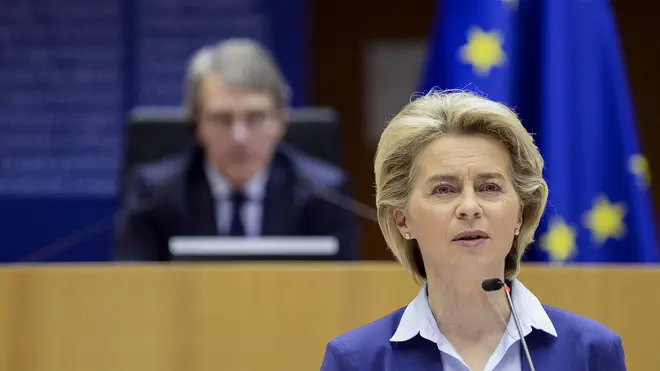
Paul Brand 10am - 12pm
17 March 2021, 12:22 | Updated: 17 March 2021, 15:32

EU chief hints jab exports could cease
EU Commission President Ursula von der Leyen has accused AstraZeneca of "underproducing and underdelivering" in vaccine production and said Europe is "ready to use whatever tool we need" to get their fair share.
Ms von der Leyen said in a statement that the start of the vaccine rollout was "tough" but added "progress has been made".
The Commission boss went on to accuse vaccine manufacturer AstraZeneca of "underproducing and underdelivering", and blamed the company for delays to the EU's vaccine programme.
She also said the epidemiological situation is "getting worse" in the EU and is becoming "worrisome".
There is the "crest of a third wave forming in member states", Ms von der Leyen said, and she also commented on the increasing number of new variants.
And in one of her strongest statements so far, she hinted that the EU could block vaccine exports to the UK under emergency powers.
Downing Street responded this afternoon by urging the EU to "stand by its commitment" not to restrict exports of vaccines.
READ MORE: All over-50s in England invited to book coronavirus vaccination
READ MORE: What is a vaccine passport and how do I get one?

The start was tough. Now we’re making progress on vaccination:
— Ursula von der Leyen (@vonderleyen) March 17, 2021
• BionTech-Pfizer and Moderna are delivering on their contracts
• First Johnson & Johnson vaccines to arrive in April
We can achieve our target to have 70% of adults fully vaccinated by the end of summer.
"Open roads run in both directions and this is why we need to ensure that there is reciprocity and proportionality," Ms von der Leyen said.
"I want to be clear on reciprocity. If the situation does not change, we will have to reflect on how to make exports to vaccine-producing countries dependent on their level of openness.
"We are exporting a lot to countries that are themselves producing vaccines and we think this is an invitation to be open, so we also see exports from them coming back to the European Union.
"The second point that is of importance for us, we will reflect on whether exports to countries who have higher vaccination rates than us are still proportionate."
She added that the EU is "ready to use whatever tool we need to deliver on that".
"This about making sure Europe gets its fair share," she warned.
Boris Johnson's official spokesman said: "I would point you back to the conversation the Prime Minister had with Ursula von der Leyen earlier this year.
"She confirmed then that the focus of their mechanism was on transparency and not intended to restrict exports by companies where they are fulfilling their contractual responsibilities.
"It remains the case we would expect the EU to continue to stand by its commitment."
The EU has been exporting vaccines in support of global cooperation.
— Ursula von der Leyen (@vonderleyen) March 17, 2021
But open roads run in both directions.
If needed we’ll reflect on how to adjust our exports based on reciprocity and, in the case of countries with higher vaccination rates than us, proportionality.
In a series of tweets following the speech, Ms von der Leyen said: "The start was tough. Now we’re making progress on vaccination:
"BionTech-Pfizer and Moderna are delivering on their contracts
"First Johnson & Johnson vaccines to arrive in April
"We can achieve our target to have 70% of adults fully vaccinated by the end of summer."
The tweets continued: "The EU has been exporting vaccines in support of global cooperation.
"But open roads run in both directions.
"If needed we’ll reflect on how to adjust our exports based on reciprocity and, in the case of countries with higher vaccination rates than us, proportionality."

Nick Ferrari challenges French politician on Covid vaccine suspension
Her comments come as the European Union's executive body proposed the introduction of coronavirus passes to let its 450 million residents travel freely across the 27-nation bloc by the summer.
The plan, which will be discussed next week during a summit of EU leaders, foresees the creation of vaccine certificates aimed at facilitating travel from one member state to the other.
The topic has been discussed for weeks and has been a divisive topic. The travel industry and southern European countries dependent on tourism, like Greece and Spain, have been pushing for the quick introduction of the measure, which could help avoid quarantine and testing requirements.
But several member states, including France, argued that it would be premature and discriminatory to introduce such passes because a large majority of EU citizens have not had access to vaccines so far.
To secure the agreement of all member states, the European Commission proposed that its so-called Digital Green Certificates, which should be free of charge, would be delivered to EU residents who could prove they had been vaccinated, but also to those who tested negative for the virus or had proof they had recovered from it.
According to data compiled by the European Centre for Disease Prevention and Control, less than 5% of European citizens have been fully vaccinated amid delays in deliveries and production of vaccines.
But the European Commission remains confident it can achieve its goal of 70% of the adult population being vaccinated by the end of the summer.